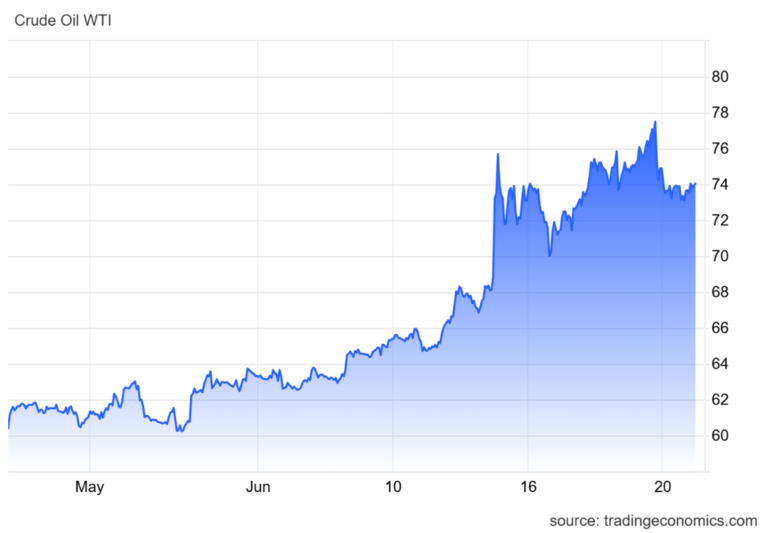Published Thursday, Jun 19 2025 6:13 AM UTC+0
Rising Tensions in the Middle East Send Oil Prices Soaring Amid Threat to Strait of Hormuz
In the wake of escalating conflict between Israel and Iran, global energy markets are experiencing heightened volatility, with Brent crude prices surging by 12% in just one week.
Since Israel launched a targeted attack on Iran’s military and nuclear infrastructure on Friday, June 13, tensions in the region have intensified, with hostilities still ongoing. The fallout from the conflict is already rippling through global markets, as energy prices — closely linked to oil prices — begin to climb.
Iran, home to the world’s largest combined oil and gas reserves according to the Iranian state news agency IRINN, has threatened to close the Strait of Hormuz — a strategic maritime chokepoint through which nearly a fifth of global oil trade passes. Such a move would mark a dramatic escalation with potentially severe consequences for global energy supply chains. Al Jazeera. (2025)

Brent crude, one of the world’s key oil price benchmarks, jumped from $66 to $74 per barrel in the past week, marking a 12% increase — a sharp response to both the conflict and the looming threat to oil transit routes.
The Strait of Hormuz, the narrow waterway connecting the Persian Gulf to the Gulf of Oman, serves as the only maritime passage from the oil-rich Persian Gulf to global markets. Its closure would represent a significant disruption to the flow of oil, gas, and other vital exports, prompting concerns among global suppliers and heightening fears of broader economic impacts.
Shell Warns of Major Trade Disruption as Israel-Iran Conflict Threatens Global Energy Stability
The world-leading energy supplier commented on the influence that would take place within the Israel-Iran conflict.
As tensions escalate between Israel and Iran, energy executives and analysts are sounding the alarm over the potential for severe global economic repercussions, particularly if the Strait of Hormuz, through which nearly 20% of the world’s oil supply flows, is blocked.
Shell CEO Wael Sawan, who spoke to The Guardian, has warned of a “huge impact on trade” should the conflict worsen, citing the strategic vulnerability of the Strait of Hormuz. Almeida, L. (2025).
Speaking to CNBC alongside the chief executives of TotalEnergies and EnQuest, Sawan emphasized the critical nature of energy infrastructure in maintaining global supply chains. All three leaders highlighted that continued attacks on vital energy assets could significantly disrupt oil flows, trigger price shocks, and destabilize markets worldwide. Meredith, S. (2025)
The correlation between oil and broader energy costs remains a pressing concern. As wholesale oil prices rise, consumers face immediate consequences at the pump. Hooker, L. (2025).
However, the impact runs deeper: elevated energy costs translate into higher production and transportation expenses, which ultimately feed through to shelf prices, raising the cost of essential goods and services globally.
David Oxley, an economist at Capital Economics, drew a parallel to the early days of the Ukraine conflict, telling the BBC, “Many will remember the shock to prices that followed the beginning of the Ukraine conflict. That was in large part a response to higher gas prices.” Hooker, L. (2025).
The current situation poses similar threats. Analysts predict that if oil prices climb back to, or beyond, the \$100 per barrel mark, inflation could spike by an additional 1% across advanced economies. According to Capital Economics, this would present a significant challenge for central banks already struggling to rein in inflation and lower interest rates. Hooker, L. (2025).
With global energy prices poised to rise further, concerns are mounting over worsening living conditions, especially in developing nations. As access to affordable fuel and food tightens, the economic strain could deepen, raising fears of a broader humanitarian impact.
Policymakers and markets are now watching the Middle East with intense focus, hoping that diplomatic efforts can de-escalate the crisis before it inflicts lasting damage on the global economy.
Referencing: –
Hooker, L. (2025). Oil prices: How the Israel-Iran conflict could affect energy costs. [online] 13 Jun. Available at: https://www.bbc.com/news/articles/cg5vr2rvzg4o.
Al Jazeera. (2025). What is the Strait of Hormuz, could it factor into Israel-Iran conflict? [online] Al Jazeera. Available at: https://www.aljazeera.com/news/2025/6/14/what-is-the-strait-of-hormuz-could-it-factor-into-israel-iran-conflict.
Almeida, L. (2025). Shell boss warns of ‘huge impact on trade’ if Israel-Iran conflict escalates. [online] The Guardian. Available at: https://www.theguardian.com/business/2025/jun/19/shell-boss-warns-of-huge-impact-to-trade-israel-iran-conflict-oil-strait-of-hormuz
Meredith, S. (2025). Oil analysts left scratching their heads over Israel-Iran conflict: ‘Your guess is as good as mine’. [online] CNBC. Available at: https://www.cnbc.com/2025/06/18/oil-prices-analysts-scratching-their-heads-over-isreal-iran-conflict.html
